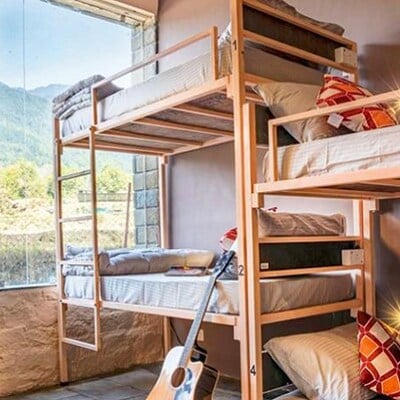India-based hostel companies are expanding into international markets after establishing their presence in key Indian destinations.
Industry experts believe that the pandemic has changed traveller preferences. With the rise of remote work, many are embracing digital nomadism, opting for longer stays and work-friendly accommodations.
Click here to connect with us on WhatsApp
Turning this to its advantage, Zostel, a branded hostel chain in India and Nepal with around 75 Indian cities and over 100 hostels and homes, and The Hosteller, another backpacker hostel chain with 60 properties in India, told Business Standard they plan to expand further, not just in Indian regions but also internationally.
“The USA is going to be a strong area of focus for future expansion, and along with that, we have seen strong growth interest in Southeast Asian markets to bring the brand presence more global,” said Dharamveer Singh Chouhan, co-founder of Zostel and CEO at Zo World. “We’ll be adding around 1,000 beds in the global market within the next two years,” he added.
The Hosteller recently raised $4 million in its Series A funding to expand its base of hostels, marketing, and other general purposes.
“We are right now focused on Southeast Asia for our international expansion. By the end of next year, we plan to be in at least three countries in Southeast Asia, as well as in countries like Nepal and Sri Lanka,” said Pranav Dangi, founder and CEO of The Hosteller.
The Southeast Asia region offers itself as a bridge to Australian, New Zealand, Chinese, and Russian travellers. At the same time, Southeast Asia is a more affordable continent compared to Europe and North and South America, explained Dangi.
“The ecosystem in Southeast Asia for a backpacker hostel is quite strong, and the people there know what backpacker hostels are. So, expanding there would be easier than expanding to any other region in the world,” Dangi added.
On the domestic side, both hostel chains aim to expand their reach in northeast India. For Zostel, Rajasthan has always had higher demand compared to other regions.
The coming quarter is expected to experience higher demand across all regions, with Goa, Gokarna, Kerala, and Karnataka seeing approximately 95 per cent occupancy rates. The festive season further accelerates demand across Rajasthan, Maharashtra, and Northern India, extending to the New Year, said Chouhan.
Zostel also plans to tap into the potential market in Tier-II, III, and IV cities and add around 15,000 beds in the Indian market by December 2025.
The Hosteller sees major demand from the northern states and currently has 25 new properties in the pipeline.
“The plan for the next 24 months is to open around 125-130 properties pan-India. We want to become a 200-property-strong company,” Dangi added.
Dangi envisions the company reaching an initial public offering (IPO) stage in the next five years. “I think we need another two to three (funding) rounds. The idea is to reach anywhere close to Rs 2,000-2,500 crore in top line and then go for an IPO.”
“We have three revenue streams, with home sales contributing 80 per cent, food and beverage contributing 15 per cent, and ancillary services, which include concierge services, events, and activities, contributing 5 per cent to the business,” Dangi added.
The Indian hostel chains are also banking on technology-driven expansion, with several facilities having contactless check-in systems. For The Hosteller, Dangi claims that technology has played a role in maximising sales.
Zostel, a part of Zo World, considers itself a tech-led real estate company rather than just a hostel chain, Chouhan said. “We are building the IRL real estate for the new generation who will be building and consuming the digital world in the era of a more open, accessible, and decentralised internet economy,” he added.
First Published: Oct 11 2024 | 5:38 PM IST











